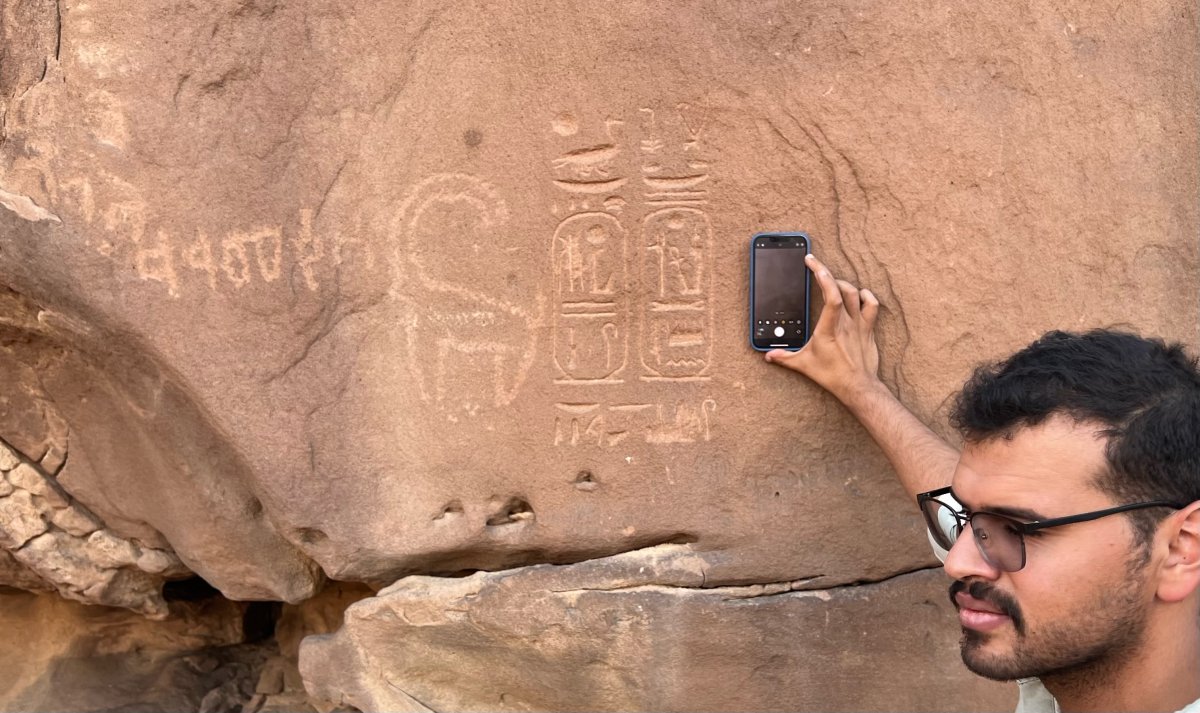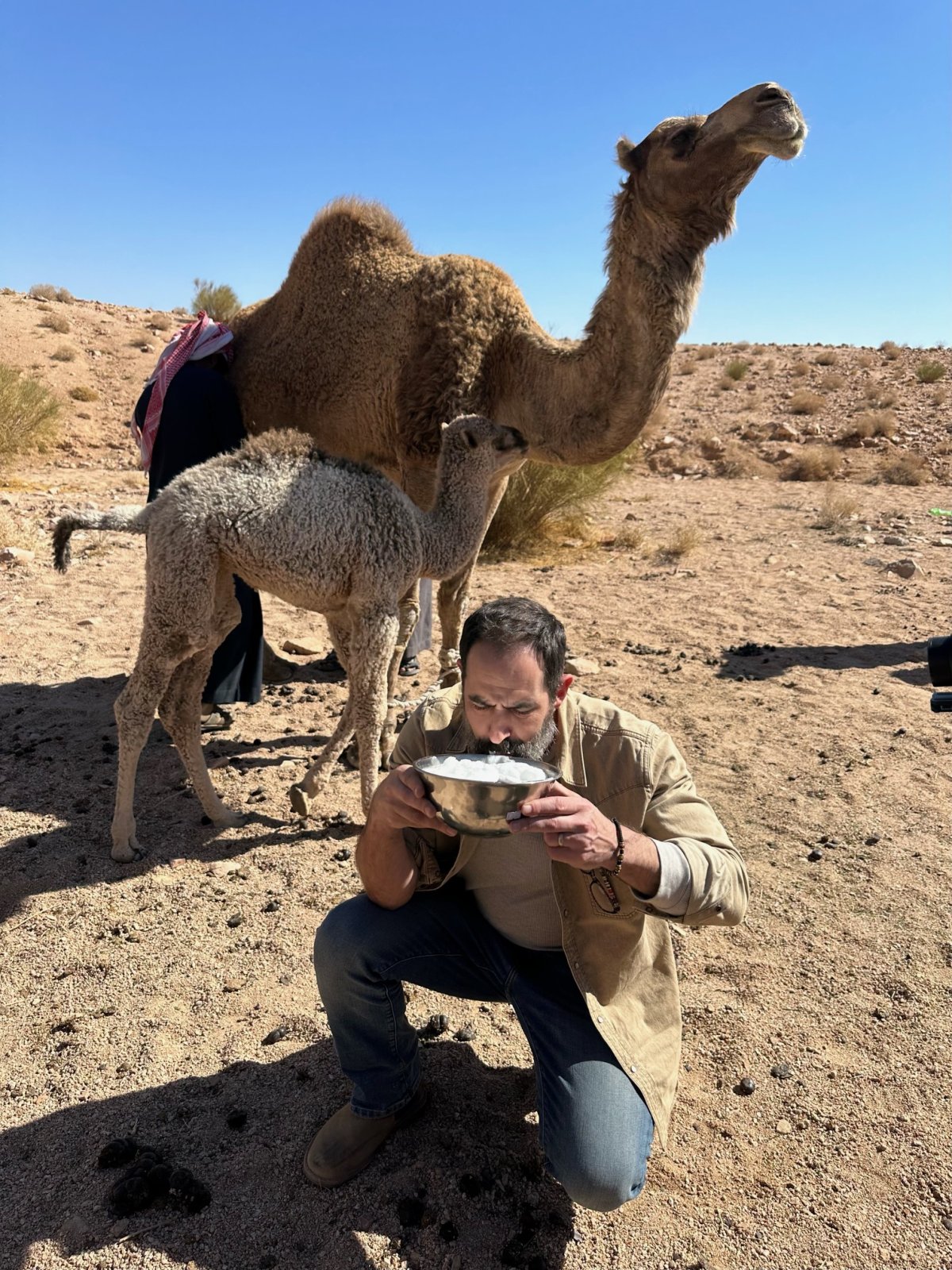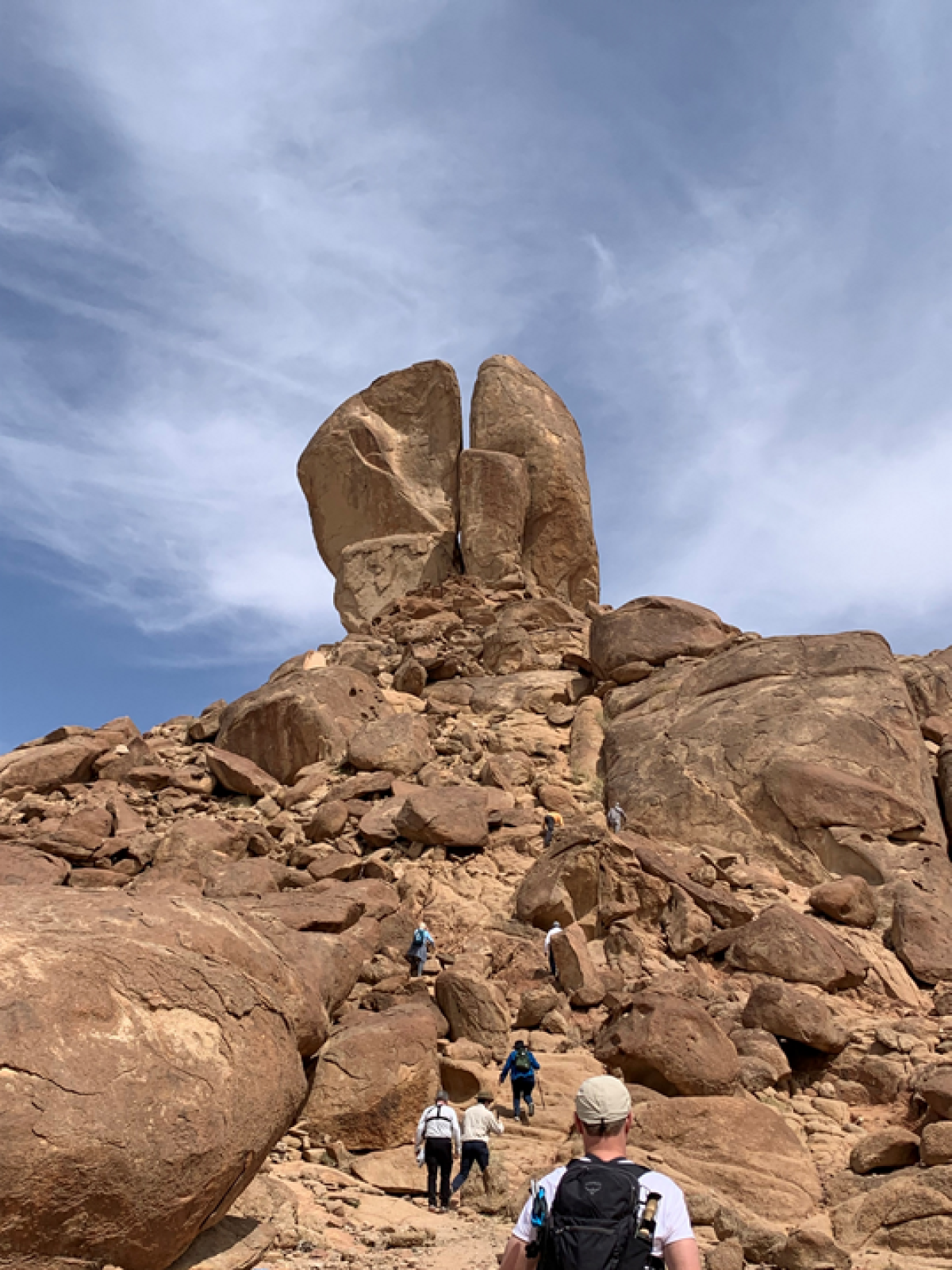Handing out Bibles is illegal in Saudi Arabia. Proselytizing could carry the death penalty. The birthplace of Islam and the Prophet Muhammad ranks among the lowest countries in the world for human rights. It was home to 15 of 19 of the 9/11 attackers.
Delaware resident Pam Laurion loves it.
She has been on three trips to visit sites that tie back to biblical history, encouraged by reforms under Saudi Arabia's de facto ruler Mohamed bin Salman, who has begun opening to the outside world and says he seeks to promote a more moderate form of Islam even as he is accused of entrenching absolute rule — and of complicity in murder.
"My time and money spent in Saudi Arabia was extremely productive in forming new relationships and lifelong friends, not only for me and our team, but for the Saudis we encountered," Laurion told Newsweek. "This is a step forward and money well spent."
Laurion is one of a growing number of Christians from the United States who have seized on the chance to visit Saudi Arabia, and are raving about what they find there.
Those visits can also only help the vast public relations effort being mounted by Saudi Arabia to rebrand the country under the ruler, known by his initials MBS, as an outpost of modernity with a vision of the future rather than an austere and harshly repressive theocracy. Not everyone is convinced that rebranding is accurate.
"While this specific tourism opening can be seen as a small gesture of the Saudi regime towards religious tolerance, it is most likely an attempt to cosmetically mask its extensive history and ongoing legally-enforced practice of religious persecution," said Javier El-Hage, the chief legal and policy officer of the New York-based Human Rights Foundation.
El-Hage points to the 2022 U.S. Embassy Report on International Religious Freedom for Saudi Arabia and notes that the country raids "home churches," outlaws the display of non-Muslim religious symbols and persecutes anyone who attempts to organize religious activity in private spaces.
"The human rights situation has deteriorated markedly in the past few years," said Ayat Basma of Amnesty International, highlighting harsh sentences for those who call for political change online – including a 45 year jail sentence for one woman; a death sentence for one man for online posts; and a 34-year sentence for a doctoral student and mother of two because she retweeted posts from dissidents critical of MBS.
Newsweek made several requests for comment to the Saudi embassy to the United States, but did not get a response.
MBS told Fox News in September that some laws needed changing and that he hoped a more experienced judge in an upcoming new phase of the trial would ensure the man is not executed. But despite the Saudi crown prince's spoken commitment to reform, he himself was accused by U.S. intelligence of approving the operation in which journalist Jamal Khashoggi was killed and dismembered in 2018. MBS denies the accusation.
Biblical Land
The politics is a world away from the one that the Christian tourists are coming to Saudi Arabia to find – one where they feel a closeness to biblical landscapes and history that is not so easy to find in locations where tourism is better developed.
Tours visit the Red Sea, parted by Moses according to the Bible. There is the Split Rock of Horeb, where Moses is said to have miraculously provided water for the escaped Jewish slaves. There is also one of several sites that lays claim to being Mount Sinai, where Moses received the Ten Commandments.
Laurion says her 12-year-old grandson discovered a cave with petroglyphs. On another trip, she said she found living quarters thousands of years old with Hebrew inscriptions that are now being deciphered by the Museum of the Bible in Washington and she found a gravestone with what appears to be a menorah carved into it.

"Discovering things without digging is actually easy because the sections we visit had been closed for centuries," she said. "When you make these kinds of discoveries, you can't sleep at night. The artifacts testify to the biblical narrative."
One of the first companies to start taking Americans to Saudi Arabia was Idaho-based Living Passages. It has hosted 14 trips thus far, where 350 mostly Christian Americans have paid an average $5,000 apiece to visit the Arabian holy sites, said the firm's founder, Rhonda Sand.
"It's an incredibly important place that has been off-limits to believers. We're right there. We touch the 3,500 year-old altars," Sand said.
Joel Richardson, the author, preacher and documentary filmmaker who led Living Passage's first tourist group in 2019 said: "They're sitting on arguably the most significant piece of biblical real estate in the world, outside of Israel."
In a few years Christian and Jewish tourism could be Saudi Arabia's biggest sources of revenue, he proposes – though that might be ambitious given the country's vast oil and gas income or even the benefits of the Haj pilgrimage to Mecca, which this year drew over 1.8 million Muslims.
Another tour organiser is Andrew Jones. He says the tours are small, but growing, with Mormons, Mennonites and Messianic Christians.
"This has been mainly an organic grassroots interest in seeing what more and more people believe are the true exodus-relates sites," he said. "They tell me stories about coworkers, friends and family expressing concern and wondering why they wanted to visit Saudi Arabia and not Disney World."
Less Persecution
Open Doors, which supports persecuted Christians around the world, ranks Saudi Arabia as the 13th worst country for persecuting Christians on its 2023 World Watch List, though it noted that there had been a decrease in violence against Christians.
"While in the last year there were no reports of Christians being arrested or forced into marriage, or of Christian houses being attacked, physical violence against converts remains high, and several believers were forced to leave their homes," it said. It said that earlier improvements had included removing anti-Christian content from textbooks, as well as descriptions of Christians and Jews at "infidels" and "enemies of God."
In another sign of relaxation, Christianity Today reported that it was legal to sell Christmas trees and Santa Claus hats last year. There are an estimated 2 million Christians in Saudi Arabia — mostly foreign workers—compared to over 32 million Muslims, according to Open Doors.
It remains illegal to hand out Bibles, though tourists can carry personal Bibles. Members of the tour groups also have plenty of opportunities to meet local people.
"It's been flawless. Nothing negative has happened," said Sand of the 14 trips. "It's all rumor and innuendo that Saudis are hostile to Christians."
Richardson said the first reports of Christian visitors had prompted some local criticism on social media of a "Zionist" invasion of the holy lands, but that other Saudis had told the complainers to shut up.
"There's a contingency that doesn't want change, but most are hospitable and fun," he said. "I'm in love with the country. The desert, the hundreds of miles of virgin beaches with mind-bending Scuba diving — and the Bedouins are like Texans; they love their fast cars, four-wheeling, hunting and camping, and they're some of the funniest people you'll ever meet."

Jason Bivins, a professor of religion and philosophy at North Carolina State University, said that the Christians suddenly visiting Saudi Arabia are overwhelmingly conservative evangelicals and that their positive view of the country is a reflection of how reactionary it was prior to MBS assuming power.
But Everett Piper, president emeritus of Oklahoma Wesleyan University, a private Christian college, likens American Christians traveling to Saudi Arabia to them visiting the former Soviet Union under Communism, and says it can be a productive endeavor, even if dangerous or controversial.
"The key is that we do not compromise who we are. We can be gracious to our hosts while also being clear about the hope that lies within," he said.
MBS began courting American Christians in late 2018 when he invited a group of about a dozen of them led by Joel Rosenberg, the evangelical best-selling author of several fiction and nonfiction books about the region, to visit him in the Royal Palace.
"No Christian leaders had been allowed in the palace in 300 years," Rosenberg told Newsweek. "Arab leaders want to make their case that they're not the leaders who were around for 9/11."
The meeting took place about a month after Khashoggi was killed, and a member of the group asked MBS, "Did you order this? It's so ugly. It derails everything you want to do," Rosenberg recalled. He said that MBS called the killing a "heinous crime" and pledged to arrest those involved, but he also acknowledged that the killers likely believed they were carrying out an assassination that he'd support, given Khashoggi's criticism of him. MBS told Fox that arrests had been made over the killing, without going into detail.
MBS had also told the visitors how much he abhorred the 9/11 attacks, which took place when he was a teenager, another member of the delegation that met him said.
Despite rumors that a Christian church might be allowed at the $500 billion futuristic NEOM city being planned by MBS, the Saudi leader had said that his people would not accept that for now, Rosenberg said. He added that MBS had nonetheless engaged scholars to study the historic Islamic stricture that no other religion should be allowed on the Arabian Peninsula to see how that should really be applied.
"He's trying to find an audience that will listen to his case that he is fundamentally transforming Saudi Arabia. They're proud of their record of reform and they don't think they are getting a fair shake from the media," Rosenberg said.
Strains
The diplomatic relationship between Saudi Arabia and the United States has been strained at times. President Donald Trump reportedly had a cordial relationship with MBS, but on the campaign trail President Joe Biden had said the country should be a "pariah" for the killing of Khashoggi. With soaring gasoline prices pushing up inflation last year, however, Biden nonetheless met MBS in an encounter that angered human rights activists.
And while there might be some liberalising reforms in Saudi Arabia – not only when it comes to religion but in allowing women to drive for instance – there is no relaxation of MBS's political hold. Freedom House's Global Freedom Index 2022 ranks it on a par with Afghanistan for political freedom, among the lowest countries in the world.
In May, 2022, Thomas Schirmacher of the World Evangelical Alliance attended an interfaith gathering in Riyadh hosted by the Muslim World League, which is sponsored by Saudi Arabia. He told Newsweek that the reforms made by MBS are "real and visible," but so far amount to "small steps."
Not all U.S. evangelicals support the surge in tourism in Saudi Arabia.
James Spencer, the president of the evangelical D. L. Moody Center in Massachusetts, cites a 2022 U.S. State Department report that the country engages in "systematic, ongoing, egregious violations of religious freedom."
"While one could make the case against supporting any number of locations with tourist dollars, Christians considering a visit to a highly disputed site in a country that continues to persecute the Church should do so with eyes wide open," he said.
Tommie Collie of North Carolina is not discouraged. He was also on an early trip and says the most moving experience was gazing at the Red Sea because his favorite Bible story as a child had been the parting of the waters by Moses.
"Yes it bothers me evil exists, but it did not bother me to spend my money there. I truly believe it was for the good. When I travel, my goal is to show the love and compassion of Christ," Colie told Newsweek. "I've traveled to around 25 countries in my life knowing that atrocities exist all over the world. There is good and bad in every country. If I did not travel because of bad things that exist, I would not be able to go anywhere."

Uncommon Knowledge
Newsweek is committed to challenging conventional wisdom and finding connections in the search for common ground.
Newsweek is committed to challenging conventional wisdom and finding connections in the search for common ground.
About the writer
Paul Bond has been a journalist for three decades. Prior to joining Newsweek he was with The Hollywood Reporter. He ... Read more
To read how Newsweek uses AI as a newsroom tool, Click here.






